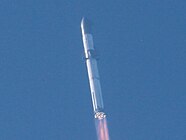ISS's Expedition 69 and Axiom Mission 2 Tiangong's Shenzhou 17 crew before launch | |
| Orbital launches | |
|---|---|
| First | 3 January |
| Last | 30 December |
| Total | 223 |
| Successes | 211 |
| Failures | 11 |
| Partial failures | 1 |
| Catalogued | 212 |
| National firsts | |
| Spaceflight | |
| Satellite | |
| Space traveller | |
| Rockets | |
| Maiden flights |
|
| Retirements | |
| Crewed flights | |
| Orbital | 6 |
| Orbital travellers | 21 |
| Suborbital | 5 |
| Suborbital travellers | 30 |
| Total travellers | 51 |
The year 2023 saw rapid growth and significant technical achievements in spaceflight. For the third year in a row, new world records were set for both orbital launch attempts (223) and successful orbital launches (211). The growth in orbital launch cadence can in large part be attributed to SpaceX, as they increased their number of launches from 61 in 2022 to 98 in 2023. The deployment of the Starlink satellite megaconstellation was a major contributing factor to this increase over previous years. This year also featured numerous maiden launches of new launch vehicles. In particular, SSLV, Qaem 100, Tianlong-2, Chollima-1,and Zhuque-2 performed their first successful orbital launch, while SpaceX's Starship – the world's largest rocket – launched two times during its development stage: IFT-1 and IFT-2.
In terms of national-level scientific space missions, ISRO successfully soft-landed Chandrayaan-3 on the Moon, Roscosmos's Luna 25 failed to land on the Moon, NASA's OSIRIS-REx returned an asteroid sample from 101955 Bennu back to Earth and NASA's Lucy probe performed a flyby of asteroid 152830 Dinkinesh. This year also saw the launch of ESA's Jupiter Icy Moons Explorer probe, JAXA's XRISM space telescope, JAXA's SLIM lunar lander, and NASA's Psyche asteroid probe.
Two crewed space stations, the International Space Station (ISS) and Tiangong, were in operation in 2023. In terms of crewed missions, the ISS saw Expedition 68, 69, and 70, while Tiangong saw Shenzhou 15, 16, and 17. The ISS also briefly hosted crews of Axiom Mission 2, a private spaceflight mission. Notably, because Soyuz MS-22 was afflicted by a coolant leak, Soyuz MS-23 was launched as a replacement crew return vehicle.
This year also saw the first time citizens of Antigua and Barbuda and Pakistan crossed the 50 mi (80 km) altitude mark, which is the United States's definition of outer space. They did so in a suborbital launch organized by Virgin Galactic, however, they did not managed to cross the Kármán line (100 km or 62 mi). Albania, Djibouti, Ireland, Oman and Vatican City (on behalf of Italy) have their own satellite in orbit for the first time in 2023.





